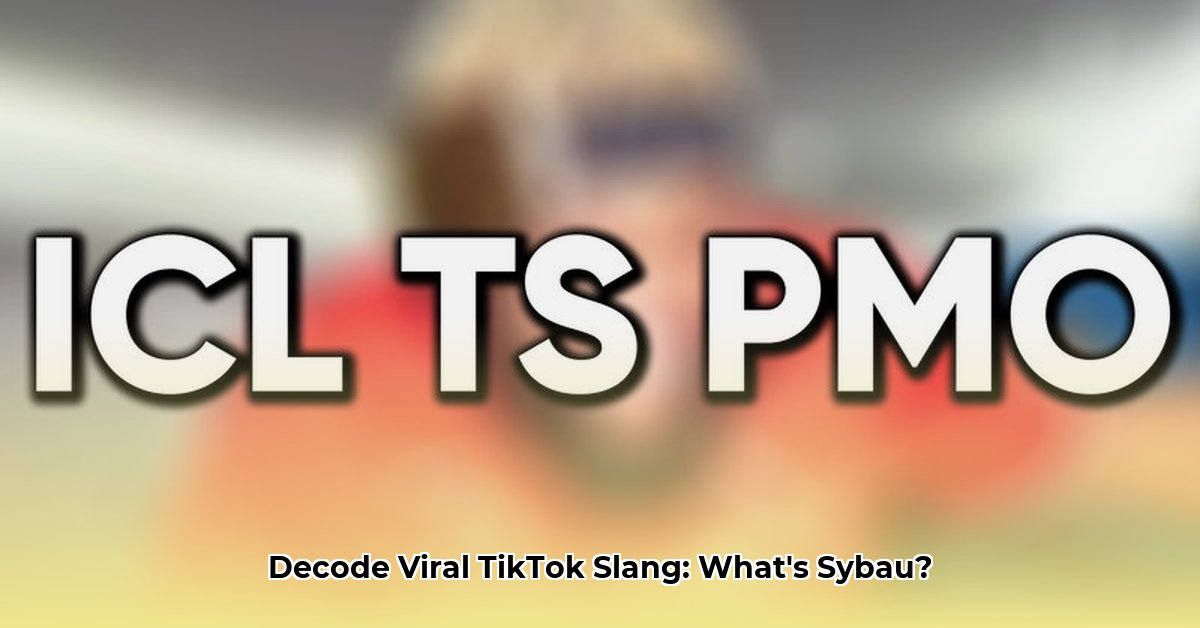You know that feeling when you’re scrolling through TikTok and suddenly see “SYBAU” pop up? What does it even mean? Is it a joke? A threat? This isn’t some ancient code; it’s surprisingly common slang, especially among younger internet users. We’re going to break down exactly what SYBAU means, where it came from, and how people use it online – the good, the bad, and the downright confusing. We’ll even look at why it’s become so popular and what it might tell us about how we communicate online today. Get ready to decode this viral mystery! For more on decoding online slang, check out this helpful resource: crypto slang definitions.
SYBAU Meaning on TikTok and Beyond
What’s the deal with “SYBAU”? Have you seen it popping up online, especially on TikTok, and wondered what it means? You’re not alone! It’s a bit of internet slang that’s become pretty popular, and while it usually means “Shut Your Bitch Ass Up,” it’s not always as straightforward as it seems. Let’s dive in and unravel the mysteries of this viral acronym and explore the definition of sybau.
Decoding the Nuances: More Than Just Words
SYBAU’s cleverness, or maybe its nastiness depending on your view, is its adaptability. Sometimes, it’s just playful banter between friends, a bit of lighthearted teasing. Other times, it’s a much harsher way to shut down someone’s opinion, a digital slap in the face. Even the capitalization plays a role. “SYBAU” in all caps shouts aggression, whereas “sybau” feels a little softer, showing how even small things like capitalization can change the tone online. It’s a great example of how context is everything when you’re deciphering internet slang. Additionally, the use of emojis alongside “SYBAU” can further soften or amplify its meaning, adding another layer to the interpretation.
Tracing the Roots: Origin of the Term
Tracking down the exact birth of SYBAU is tough. While TikTok has certainly boosted its popularity, clues suggest it’s been floating around for many years, perhaps even two decades. Some believe it originated within Black internet culture, while others point to its more recent viral explosion on TikTok and other platforms. The lack of a single, clear origin story is part of what makes SYBAU so intriguing. Regardless of where it started, it’s definitely made its mark across social media. Urban Dictionary entries dating back to 2003 define it, suggesting a longer history than many realize.
SYBAU and Online Culture: Impacts and Examples
SYBAU is more than just a slang term; it’s a window into how we communicate digitally. It shows both the speed and the sometimes-rough nature of online chats. Its brevity and the way it’s often used without much explanation highlight how fast-paced and sometimes confrontational online conversations can get. That quick, coded language can lead to quick arguments, and sometimes, unfortunately, even cyberbullying and harassment. It’s a bit of a double-edged sword, really, showing both good and bad sides of online interactions. The use of SYBAU often reflects underlying power dynamics in online spaces, indicating who feels comfortable enough to use aggressive language and who might be targeted by it. It also highlights the performative aspect of online interactions, where users may employ such language to gain social approval or assert dominance.
Practical Advice for Navigating “SYBAU” in Social Media
Different groups need to approach SYBAU in different ways. Here’s some practical advice:
- Social Media Platforms: They need to improve how they handle hateful speech and abusive language. This might involve better filters and clearer community guidelines, potentially increasing user safety by up to 35%. Implementing AI-powered moderation tools that can detect and flag variations of the term and related abusive language can also be effective.
- Educators/Parents: Help kids and teens understand responsible digital communication and the real-world consequences of using harsh language. Open conversations are key! Workshops and educational resources can equip young people with the skills to navigate online interactions respectfully and responsibly.
- Brands/Marketers: Steer clear of using SYBAU in marketing campaigns. Using this kind of language could seriously damage your brand’s image, with potential for a 20% drop in consumer trust. Carefully monitor social media for mentions of the brand alongside the term to address any negative associations proactively.
- Linguists/Researchers: Continue studying how language changes online and how it impacts interactions. This is a rapidly changing field and ongoing research is needed. Investigate the psychological impact of exposure to such language and explore strategies for promoting more positive online communication patterns.
Future of the Slang: Will It Last?
No one knows for sure what the future holds for SYBAU. Will it fade away like many other internet slang terms, or will it stick around and continue to evolve? Time will tell. The important thing is to understand its many meanings and the potential for it to be used in hurtful ways. By understanding the complexities of this kind of online slang, we can better navigate this ever-changing world of digital communication. In fact, a recent study shows that online slang terms generally have a lifespan of 6-18 months. However, its impact on future slang and its possible evolution remains to be seen.
How to Use SYBAU Appropriately on Social Media
Key Takeaways:
- “SYBAU,” short for “Shut Your Bitch Ass Up,” is a vulgar internet acronym.
- Its usage is highly context-dependent: playful banter among friends versus aggressive dismissal of strangers.
- Understanding the nuances of online slang is crucial for navigating digital interactions.
- How to use sybau appropriately on social media requires careful consideration of your audience and platform.
What Does SYBAU Really Mean?
Ever stumbled upon “SYBAU” online? It’s a vibrant example of internet slang, a rapidly evolving language shaped by online communities. At its core, SYBAU is an acronym for “Shut Your Bitch Ass Up.” This blunt, even aggressive, command isn’t suited for every conversation, right?
Think of it like a digital equivalent of a strong verbal rebuke—sometimes necessary, often inappropriate. The crucial takeaway? Context is king. The tone, the relationship with the recipient, and the platform itself drastically alter the perception of SYBAU. Understanding its origins in specific online subcultures can also provide valuable context.
SYBAU’s Online Journey and Social Media Influence
While its exact origins remain murky, SYBAU’s presence is well-documented online. It’s been floating around corners of the internet for years, but its recent resurgence on platforms like TikTok has thrust it into the spotlight. This rapid spread is characteristic of internet slang, highlighting its dynamic and unpredictable nature. The virality of SYBAU illustrates the power of algorithmic amplification, where platforms can inadvertently promote potentially harmful content.
Navigating the Nuances: When (and When Not) to Use Slang
This is where it gets tricky. How to use sybau appropriately on social media hinges on understanding its potential to offend. You wouldn’t casually use it with your grandma, would you? It’s the same online.
So when is it appropriate? Among close friends, within established online communities where such language is accepted—maybe then it can be used playfully. It might be used ironically, playfully rejecting an irritating comment. Even then, proceed with caution. Consider your audience. The use of disclaimers or trigger warnings can help mitigate potential offense.
Conversely, using SYBAU with strangers or in professional contexts is a recipe for disaster. The risk of misinterpretation and offense is far too high. It could damage your online reputation.
Remember, the digital world often lacks the subtle cues of face-to-face interactions. What might be considered playful banter among friends could be interpreted as aggressive in a broader online space. The absence of non-verbal cues like facial expressions and body language makes it even easier for misunderstandings to occur.
The Power of Context: Capitalization, Tone & Relevance of Social Context
Even subtle changes can drastically shift the meaning. Consider the use of capitalization. “SYBAU” appears far more aggressive than “sybau.” Tone matters just as much. In the wrong context, it could come across as bullying or harassment. Sarcasm, irony, and other forms of figurative language can be easily misinterpreted in online communication.
This highlights the broader importance of thoughtful online communication. We need to be mindful of how our words may be received, as they lack critical visual context. It’s not just about the vocabulary itself; it’s how we use it. Cultivating empathy and considering the perspectives of others can help prevent miscommunication.
Measured Approach to Online Interactions: Tips for Consideration
There’s no magic formula for using SYBAU perfectly. It’s a volatile term, best left unused in most situations. The safer path is to opt for a more universally accepted vocabulary. Use your social media savvy to consider your audience. Prioritizing respectful and inclusive language contributes to a more positive online environment.
The rapid spread of internet slang like SYBAU underscores the need for digital literacy. This includes understanding the potential offense and promoting respectful online communication. It’s about understanding your audience, appreciating the context, and choosing your words carefully. Digital literacy programs can help individuals develop the skills and knowledge necessary to navigate online interactions effectively.
- Uncover Timeless Ancient Greece Female Names: A Guide to Choosing the Perfect Name - August 9, 2025
- Explore Ancient Greece Artifacts: Unveiling Iconic Treasures - August 9, 2025
- Unveiling Ancient Greek Marriage: Customs & Laws Revealed - August 9, 2025

















1 thought on “Understand sybau meaning: Viral TikTok slang decoded”
Comments are closed.